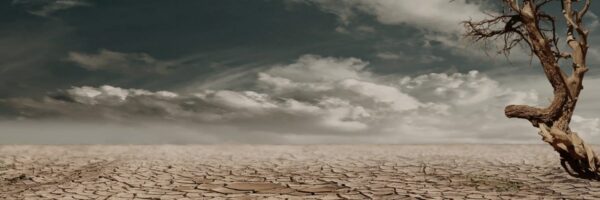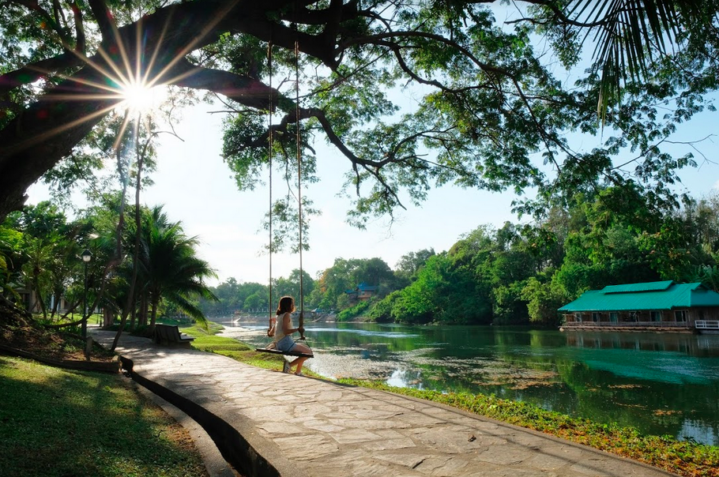
Outdoor education for families visiting Kanchanaburi
If you live in Bangkok, Kanchanaburi is on your doorstep. It’s stunningly picturesque, relatively inexpensive, easily accessible and has the most amazing clean and beautiful rivers running through its heart. I have a particular reason for knowing the water’s clean, since I work on the rivers most days and we check the water quality frequently for our water sports education business. The rivers and surrounding rural lands lend themselves to some wonderful outdoor education opportunities for the young and the young at heart. The River Kwai Yai offers all the benefits of outdoor education, from learning responsibility and building confidence through water sports, to the chance to soak up Kanchanaburi’s natural rural environment, and enjoy the flora and fauna all along the river.
Water sports and stand up paddle-boarding, in particular, engage children and adults in a unique way. Children, especially, love the feeling of control and responsibility that comes with journeying in a river environment.
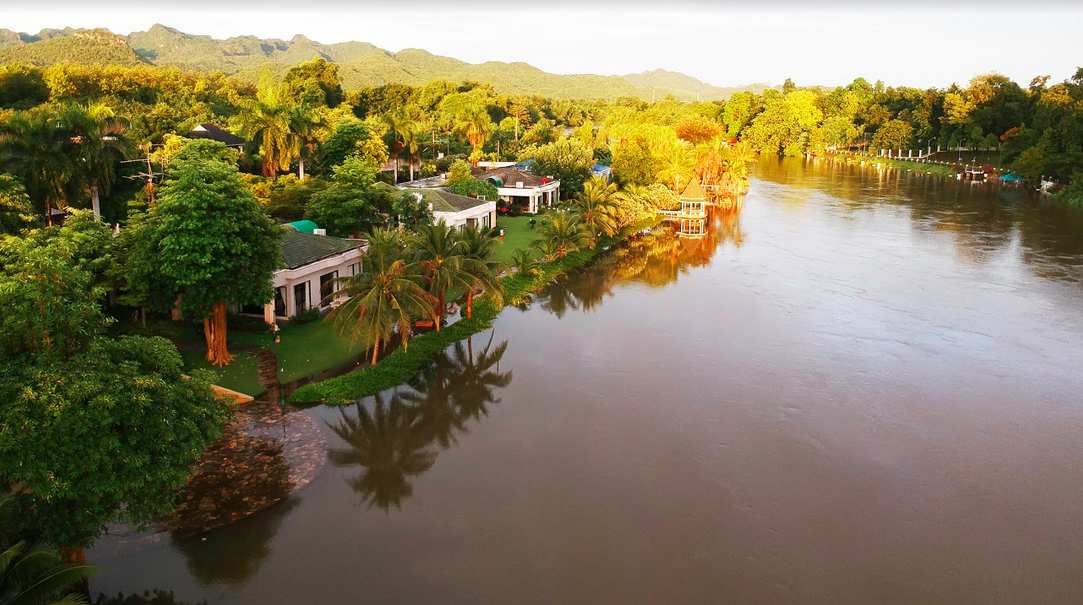
If you look around, you’ll also find some amazing accommodation at very, very competitive prices, and none more amazing that the stunning Royal River Kwai Resort and Spa. There is plenty of evidence available that points to the positive mental benefits of spending time close to water and this resort absolutely checks those boxes, being right on the riverside, and offering elegant and comfortable rooms set amongst delicate Thai garden sculptures, all surrounded by local trees, shrubs and flowers. The pool is perfect, whether you like a morning exercise regime, a midday tanning session or a cooling late afternoon dip, while the food is exquisite. Going by its longevity, the owners of this resort seem fastidious about maintenance, keeping the resort’s appearance and functionality at a very high standard. It’s a
location that’s synonymous with romance and tranquility.
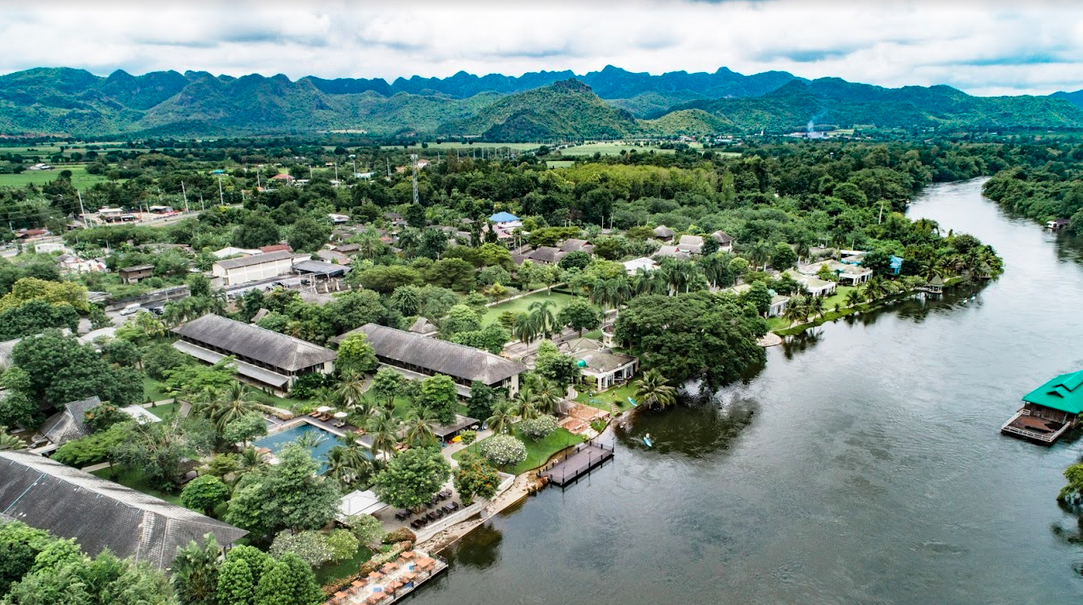
Kanchanaburi is full of places to visit and things to do, but one of the gems in plain sight is the natural world of rural Kanchanaburi itself and the River Kwai Yai, where the terrible Russian roulette scene was filmed in classic movie ‘The Deerhunter’. Reading one of the myriad books about the wartime history, or ‘The Railway Man’ by Eric Lomax to get a feeling for what the PoWs went through is recommended during your stay. The Hellfire Pass Interpretive Centre is another must for those with an interest in such history and a poignant reminder that for every PoW who suffered, many more Asian workers lived and died constructing the notorious Burma-Siam Railway.
Hellfire Pass Interpretive Centre and Memorial Walking Trail is dedicated to all Allied prisoners of war and civilian Asian labourers (Romusha) who suffered and died during the construction of the Thai-Burma railway during the Second World War. Funded and maintained by the Australian Government, the interpretive centre tells the story of the railway, the construction and attempts to covey the hardship and suffering of those who were forced to work in extremely harsh conditions.
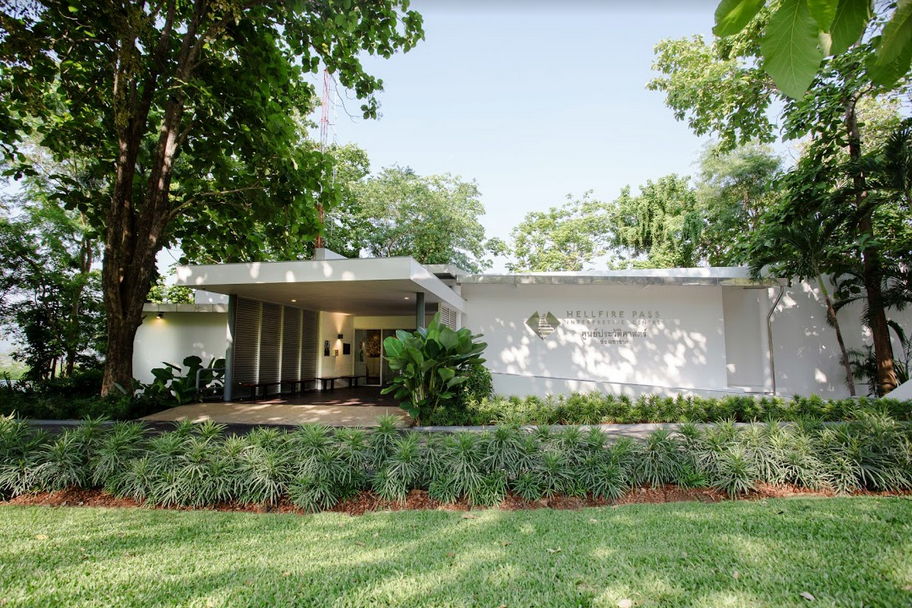
Apart from the centre and its exhibition, visitors are encouraged to proceed to the memorial walking trail. Audio Tour Guide is available to enhance the experience as you walk along the railway bed and cuttings. History aside, outdoor education can be as simple as taking your children away from the city and traffic to enjoy the peace and serenity of a location, just enjoying pointing out things of interest and, crucially, unplugging from tech for a while. It can be as simple as hiring a bike to go for an early morning rural jaunt, riding out somewhere for lunch, or reading a book in the
shade with nothing but birdsong around you.
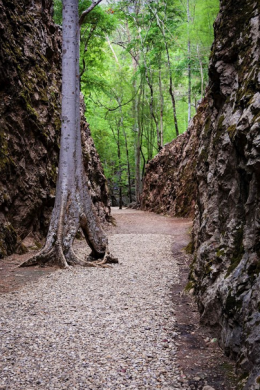
Kanchanaburi can get ferociously hot: late March to early May sees daytime temperature getting close to or even higher than 40°, so a nice pool or the pristine river offer important means to cool down. Beyond this period, temperatures throughout the rest of the year are very reasonable. Kanchanaburi ‘winter’ which starts around November and ends around the end of February, is very pleasant indeed – and campsites and ‘glamping’ sites spring up all around the region and especially up towards Erawan along the 3199 road (I advise getting in early before the hordes learn about this!). Don’t be put off, either, by the ‘rainy’ season, typically from around June to October. In my own experience here, it seems rare that it rains for days at a time -the rain appears more inclined to be a brief 30–60 minute downpour, as humidity builds during the heat of the day and the clouds burst in the cooler evening air, whilst pleasant temperatures mean you won’t freeze in the rain! In fact, the great benefit of the rainy season is that the clouds offer a degree of protection from the direct sunlight, though of course, you are still at risk of sun damage, so it’s important to take care, cover up and/or apply sunscreen, even on cloudy days. If you do choose to do something on the river, wildlife abounds: with diverse bird, mammalian or reptilian life, there is always lots to see on a journey downriver.
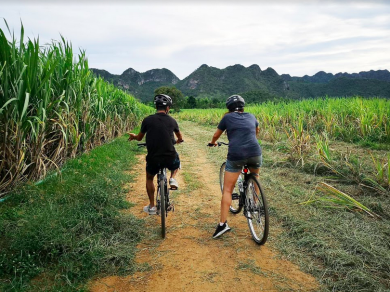
There are plenty of options for renting a bicycle in Kanchanaburi too. Go for it! Take care, check the bike over, but don’t limit yourself to the city. Try to get out into the rural areas. Cycle a few kilometres out of the city and you’ll find yourself amongst stunning scenery, with iconic mountain backdrops. Wonderful birdlife flits between the crops of rice, sweetcorn, sugarcane and lemongrass and more. Look out for the Asian Openbill Storks standing like sentinels awaiting frogs and Golden Apple Snails to appear – since these snails are both non-indigenous and consume the rice crops, the farmers welcome these graceful protectors of the rice fields.
Stand Up Paddle-boarding in Kanchanaburi
Schools, parents, organisations, and companies are increasingly using the outdoors as a means of team building and providing leadership opportunities. Stand up paddle-boarding is a great example of this, giving children and adults opportunities to engage with the process of becoming a leader, firstly simply by taking responsibility for oneself in ways that modern life doesn’t always require, through maintaining proper hydration, sun protection, and considering one’s own mental health and mindset, for example being self-motivated and optimistic about learning a new outdoors skill or through being determined when learning new skills or facing new challenges like paddling in a new or difficult environment and pushing through tiredness.
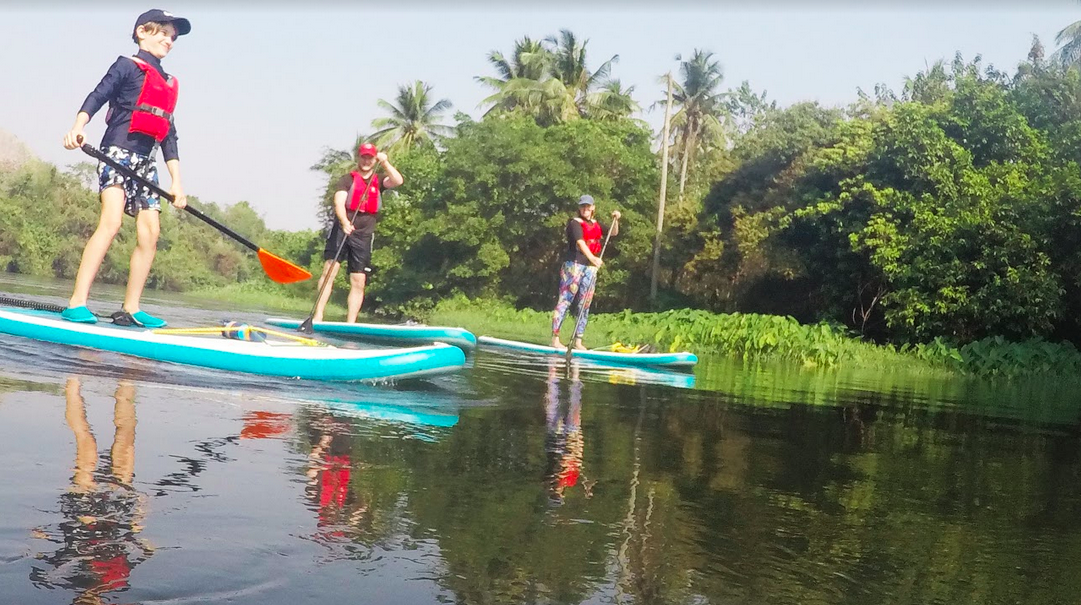
The next level of growth for leadership skills is through paddle board based expeditions, like Duke of Edinburgh (DoE) International Award Adventurous Journeys, is through rotation of roles of team responsibility like team leader, navigator, and safety lookout, with each requiring taking on different responsibilities for group progress and safety, while also taking responsibility for one’s own safety on the water, being aware of danger and one’s own capabilities.
Finally, leadership is cultivated through being part of a team, showing thoughtfulness, empathy or learning to appreciate and work with others, for example, communicating a skill effectively to others and encouraging them through an empathetic approach, particularly those who might not be as enthusiastic or skilled as oneself. Children and adults often paddle alongside less confident swimmers who might be a little anxious, watching out for them, building effective communication in games on and off the water or helping others onto the board or guiding them to make the ‘right’ decision. Team leaders may need to practise effective delegation during longer paddles (for example, rotating navigation duties or asking someone to look after the first aid kit) or simply learning to listen during opportunities for communication and compromise (for example for routes and safety). Everyone needs to practise selflessness (for
example, patience with young children) and recognition of safety and rescue techniques as being as important as games, skills and general fun.
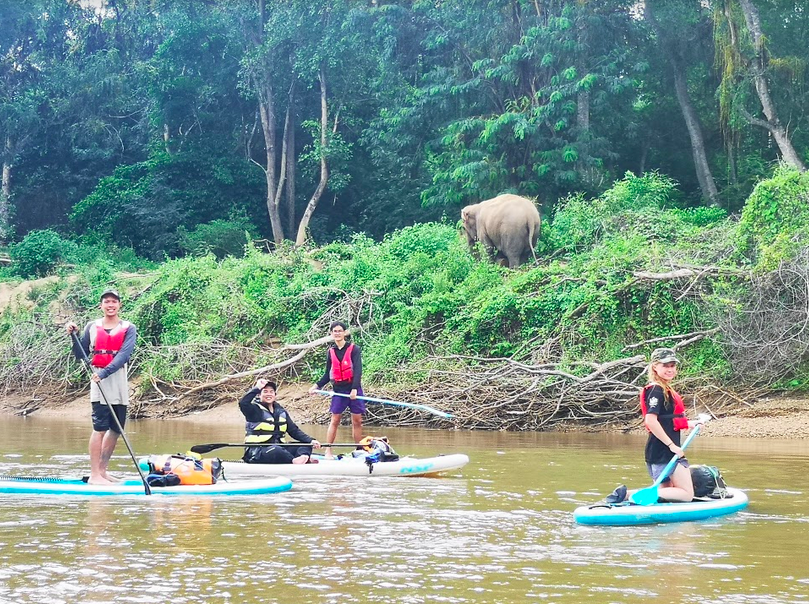
Perhaps most of all, participants all experience commitment and passion as they learn a new sport, whilst being accountable (for example, for one’s own safety, especially valid for youngsters) and making choices and decisions, all with the guidance of an instructor present.
We try to hit the mark with a mix of skills and nature-based activities along the river or out on rural bike rides. We offer a range of activities for all ages and abilities. Most people that try stand up paddle-boarding for the first time are surprised at how easy it is. We prioritise knowledge of safety, rescue, equipment and above all, respecting nature and the river while on the water. A large number of companies have come to us for team-building and we welcome students from many new and established Thai and international schools in the region. We are delighted to give everyone a break from technology and being ‘connected’ – the only connection you’ll experience is with the board, the river, those around you and with nature. It’s a very contemplative experience that engages your whole body and it’s open to old and young alike.
The benefits are not just mental and social. Physical improvements start with an improvement in balance, which has a knock-on effect on activities outside the water. Stand up paddle-boarding also provides the paddler with a full body workout because almost every muscle in the body is used at some point during paddle boarding. If you are weak or healing from an injury to your muscles and joints, paddle-boarding is an excellent exercise to increase strength gently.
You’ll also have improved cardiovascular health and better endurance. After spending a day out on a paddle-board, you might feel tired but you’ll sleep well. Above all, being out on the water is calming: engaging with nature can have a positive effect on your mental health and attitude, and getting some extra vitamin D from the sun is good for you too, providing you take it in moderation.
With that in mind, we offer various adventurous journeys and expeditions along the River Kwai Yaior Kwai Noi, which under controlled guidelines can count toward the Duke of Edinburgh’s International Award. Our team can provide Bronze, Silver or Gold level Adventurous Journeys, along with Bronze Level hikes in stunning rural Kanchanaburi. Our team is flexible, meticulous and dedicated to providing you with a lifelong memory of beautiful rural Thailand.
On our carefully planned routes, we try to show you the best of what Kanchanaburi has to offer, from rural cycling along farm tracks to paddle-boarding along its incredible rivers, no matter what your level is.
SUP Hire (Thailand), Co., Ltd www.supkanchanaburi.com



